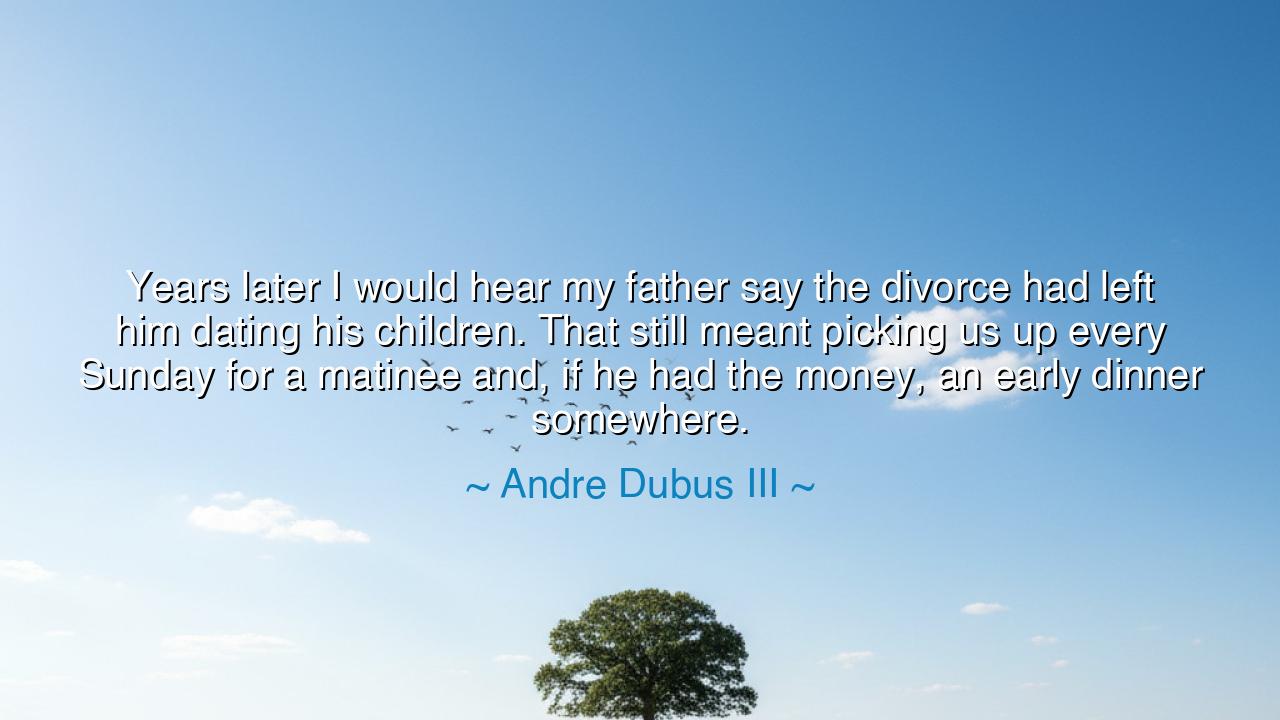
Years later I would hear my father say the divorce had left him
Years later I would hear my father say the divorce had left him dating his children. That still meant picking us up every Sunday for a matinee and, if he had the money, an early dinner somewhere.






The words of Andre Dubus III—“Years later I would hear my father say the divorce had left him dating his children. That still meant picking us up every Sunday for a matinee and, if he had the money, an early dinner somewhere”—speak not only of the pain of separation but of the quiet persistence of love that survives the ruin of a home. In this simple remembrance lies the ache of many generations: the fathers and mothers who, after the breaking of a union, walk through the long corridors of loneliness, seeking still to hold the fragile threads that bind them to their children. It is a portrait of love made humble, stripped of its daily privileges, yet enduring through the small rituals of togetherness.
In ancient times, the poets of Greece spoke of love as a flame that cannot be extinguished, only transformed. So it is here: the father, though wounded by divorce, reshapes his affection into what the world might call awkward gestures—a Sunday matinee, a modest dinner, a few hours carved from a week of absence. Yet within those brief hours lives a deeper love than can be spoken. He is no longer the constant guardian of the household; he has become a visitor, a man carrying both longing and guilt, trying to offer his children something that might resemble normalcy. And though the world may see a broken family, what we truly witness is love enduring through brokenness.
This quote, born of memory, carries the tone of both sorrow and redemption. It is the lament of a child grown wise enough to see his father’s struggle, to recognize that love, once shared between two, must now be stretched and reshaped to hold three or four hearts together. The father’s “dating” of his children reveals the deep absurdity and dignity of parental love: that it continues to give, even when it is no longer easy, even when pride is bruised and the past lies shattered. This is not the loud love of triumph, but the quiet, faithful love of endurance—the kind that shows up even when it hurts.
History, too, has seen such love. After his exile from Athens, Aristides the Just—once praised for his virtue and civic wisdom—was said to have lived in poverty, yet he continued to teach his sons the ways of honor and restraint. Though stripped of wealth and status, he walked with them each day, teaching them that fatherhood is not defined by power but by presence. The world may forget the name of a man’s office, but it will not forget the lessons of his hand or the warmth of his eyes. Like Dubus’s father, Aristides learned that even in the ruins of worldly fortune, love may still endure as a sacred duty.
There is, too, a quiet nobility in ritual, those repeated gestures that become the last bridge between distant hearts. The Sunday matinee, the dinner that may or may not happen—these are not luxuries but symbols of devotion. They remind us that love is not measured by grand acts, but by constancy. The father in the story cannot give much—perhaps only a ticket, a meal, a shared laugh—but within those small gifts lies an ocean of yearning. He is teaching his children, wordlessly, that love persists even when life fractures; that showing up, again and again, is a form of worship.
This quote also speaks of the inheritance of empathy—how children, in growing older, come to see their parents not as gods but as humans, tender and fallible. The son, now a man, looks back not with resentment but with compassion, recognizing that his father did what he could with what remained. This recognition is the flowering of wisdom: the moment when the child becomes the keeper of understanding, and the pain of the past is transmuted into forgiveness. Thus, Dubus’s reflection becomes a quiet hymn to human frailty and grace.
The lesson is clear for all who walk this earth: when the bonds of life are broken—through divorce, loss, or distance—let not love vanish with the parting. Continue to show up. Continue to give what you can. Do not let shame, poverty, or failure silence the hand that still wishes to comfort. For love that persists through hardship becomes purer, like gold refined by fire. And to those who have been the children in such a story—remember this truth: behind the awkward smiles and the weary gestures, there was always love, doing its best to survive.
So let each of us live with the courage of that father—to keep loving even when it hurts, to keep reaching out even when the world calls it futile. For in the end, it is not perfection that redeems us, but persistence. And when years have passed, and we look back upon our own lives, may we, too, be remembered not for our victories, but for the simple, sacred act of showing up—again, and again, and again.






AAdministratorAdministrator
Welcome, honored guests. Please leave a comment, we will respond soon